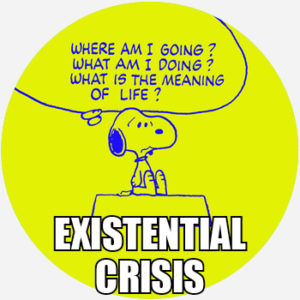Pop Culture dictionary
existential crisis
[eg-zi-, ek-si-sten-shuh l krahy-sis]
What does existential crisis mean?
An existential crisis is a psychological episode in which a person questions the meaning of their life and of existence itself.
Where does existential crisis come from?

The specific phrase existential crisis doesn’t appear in written record until at least the 1930s, when it referred to Nazism and the genocidal threat it posed to the Jewish people. Existential crisis was very literal here, with existential as an adjective form of existence (evidenced since the 17th century), describing the actual survival of the Jewish people in Hitler’s Germany.
After the Holocaust and World War II, existential crisis saw growing usage in a more philosophical way, with the focus on individual people rather than a group facing an existential threat. Social scientists began to use the term in the 1950s to characterize internal conflicts of meaning and questions of one’s purpose and existence from a psychological and spiritual standpoint. Such crises obviously caused patient stress, anxiety, and depression, making it a topic that mental-health professionals worked to treat.
As existential crises are tied to abstract conflicts within the self, they are related to philosophy as a discipline. In fact, the term existential crisis has connections to existentialism, a branch of philosophy concerned with the nature of existence. It generally emphasizes a person’s position as a free agent in the universe.
Søren Kierkegaard is widely regarded as a father of existentialism. He theorized that the world isn’t in itself meaningful, but it is rather made meaningful by individuals living authentically. In his work, Kierkegaard frequently referred to the Existents–Forhold, Danish for “condition of existence.” Influenced by Kierkegaard, French philosopher Jean Paul Sartre helped popularize the term existentialism.
Examples of existential crisis
Who uses existential crisis?
As a term, existential crisis is versatile and continues to be used for much of the same purpose as its academic debut in the 1950s. People are said to be having an existential crisis when they confront existential questions. Due to the personal and often painful nature of such an experience, people take to online forums to share, often anonymously, that they’re having an existential crisis for advice, perspective, and consolation.
Though the term is often used as a term to pinpoint internal feelings, the label can be used to describe others too. For example, when others act erratically, some may question whether or not that person is having an existential crisis with the assumption that no other psychological event would cause them to act in such a way. In fact, celebrity Shia LaBeouf has admitted that he’s had an existential crisis, which he was forced to deal with after going through a series of embarrassing incidents in 2014.
It doesn’t have to all be gloomy, though. Existential crisis can have more light-hearted applications as well. For example, if someone’s favorite celebrity shaves his head, making him look less attractive, they might jokingly exclaim that they’re having an existential crisis. Twenty-somethings and thirty-somethings may also refer to personal realizations as existential crises in an ironic, self-deprecating, or humorously reflective way. (e.g. “It’s going to be our ten-year high school union. I’m having an existential crisis!”)
The term has metaphorically extended to non-human agents as well. For example, Coke was said to be having an existential crisis when it juggled its brand as a soda with increasing health and market concerns over sugar.
Note
This is not meant to be a formal definition of existential crisis like most terms we define on Dictionary.com, but is rather an informal word summary that hopefully touches upon the key aspects of the meaning and usage of existential crisis that will help our users expand their word mastery.